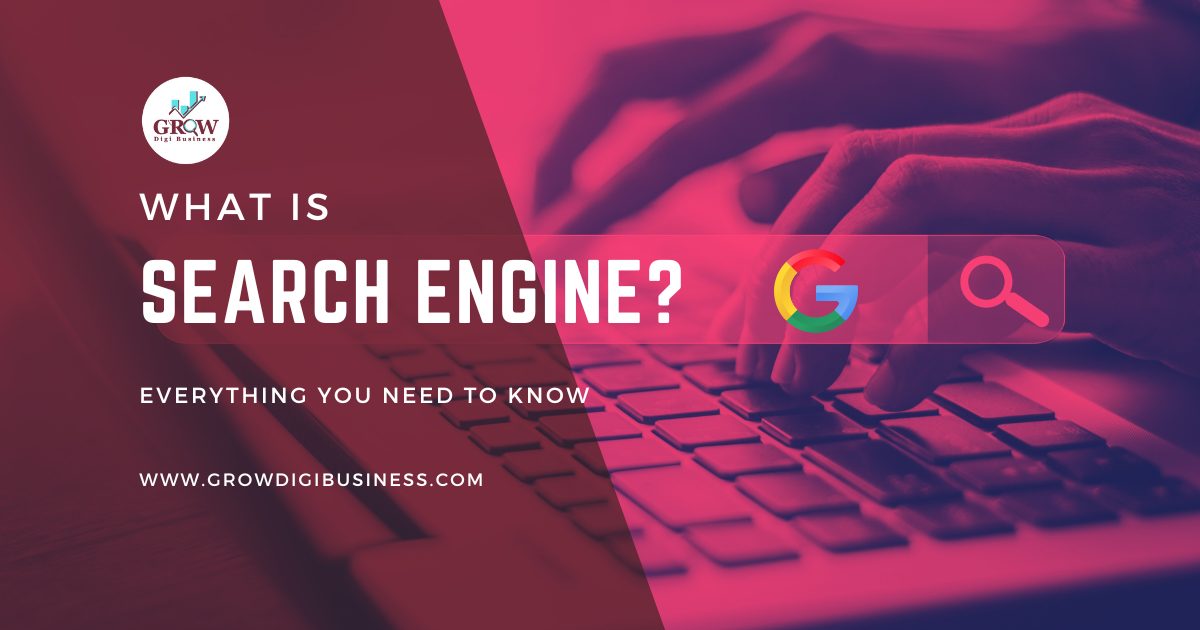
What Is a Search Engine: Everything You Need to Know
Over 5 billion people use search engines on a daily basis. Anyone with an internet connection uses them multiple times every day. Yet, most people wonder, “What is a search engine?”
A search engine is a tool you use to search the internet for information. It scans websites and catalogs their content. You input keywords, and search engines show you relevant pages. The most popular search engines are:
- Bing
- Yahoo
- Baidu
- Yandex, etc.
Understanding search engines is crucial for optimizing content for better visibility. You can rank higher and gain more traffic. It also aids in researching market trends and competitors. You will find all the necessary information about search engines in this article, and you won’t have to make another search.
Components of Search Engine
A search engine works in a complex and complicated process. I am going to keep it simple for you. Let’s start with its components first. A search engine typically has a web crawler, database, and search interface as key components.
1. Web Crawler
It’s also referred to as a spider or bot. No matter what you call it, the crawler is basically a program. Search engines use this program to scan and index websites.
The process starts by fetching a few web pages and then follows the links on those pages to find new URLs to crawl. This process continues recursively. And the final result is a vast index of web pages.
If your page is not indexed, major search engines like Google won’t find it. In other words, people won’t find your pages. You can check the visibility of your pages through Google Search Console.

Here is how the web crawler works:
- Crawlers start with a list of known URLs or seed URLs
- They download the web pages associated with these URLs
- Crawlers extract links from these pages and follow them to discover new pages.
- Content from each page is indexed to build a database. It includes keywords and metadata.
2. Database
A search engine database is a vast repository. It stores indexed information from web pages collected by web crawlers. It helps the search engine quickly find relevant pages in response to user queries. The database helps the engine find the right information for the user.
3. Search Interface
The interface is the user-friendly part of a search engine. You type in queries and get to see results. The interface consists of a single search bar where you enter keywords or phrases. Other components include a search button, results page, and filters.

How Do We Use a Search Engine?
Search engines are one of the easiest tools to use. Anyone can use it. This is why, every day, more than 3.5 billion searches are made on Google alone. There are other search engines, too!
You can use search engines both on smartphones and computers. On your computer, you can open any web browser. These browsers use search engines for users to make searches.
Let’s say you are using the Chrome browser. If you like, you can use any other browser as well. Then type “www.google.com” in the search bar and press “Enter.” For example, I am typing here “Donald Trump.”
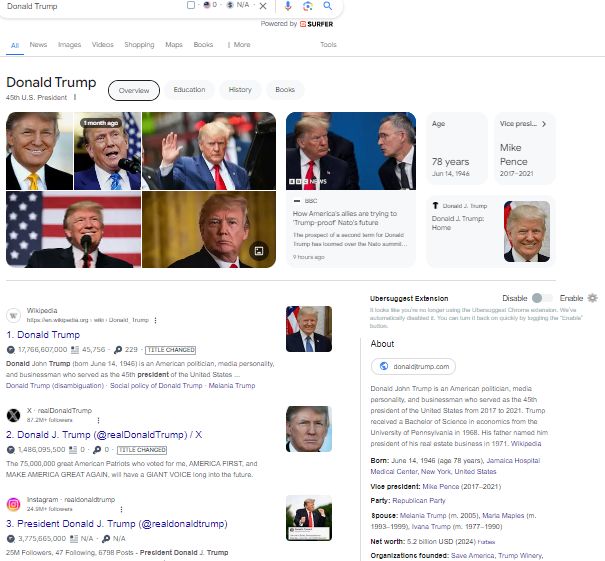
Google now appears with a huge list of results. It gives me Trump’s Wikipedia page, Instagram, X, website, and other accounts. It also displays various images, videos, and articles written on Donald Trump. Google’s database is vast, and you won’t be able to see all of those pages.
Anyway, earlier, we just used a seed keyword. You can also make direct queries like “How old is Donald Trump?”
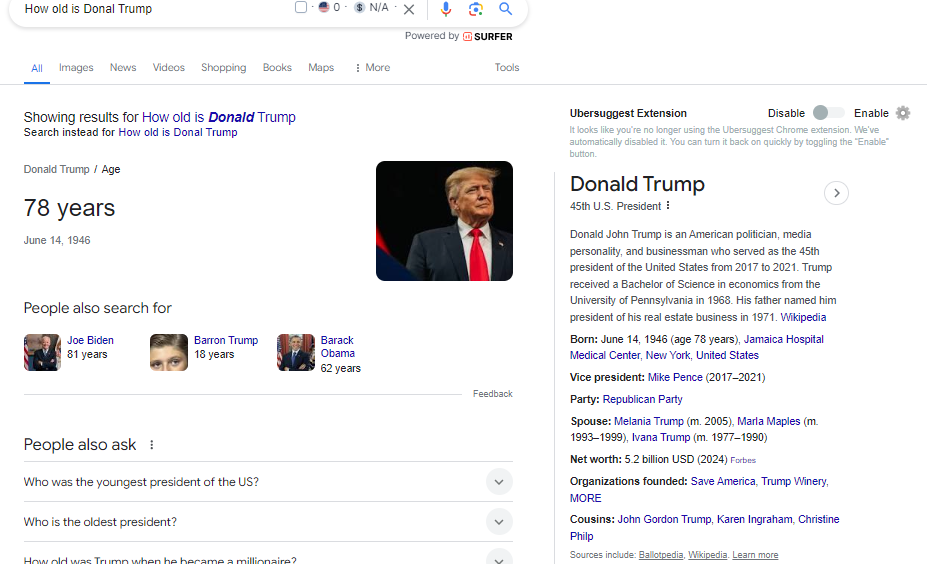
See? The result is different and more specific. I got to know Trump’s age in one search. I don’t have to go to other pages. The search engine finds the exact result for me.
You can also input website URLs. This will direct you to a website directly. Search engines help browsers find the website and take you directly there. You can see all the pages now.
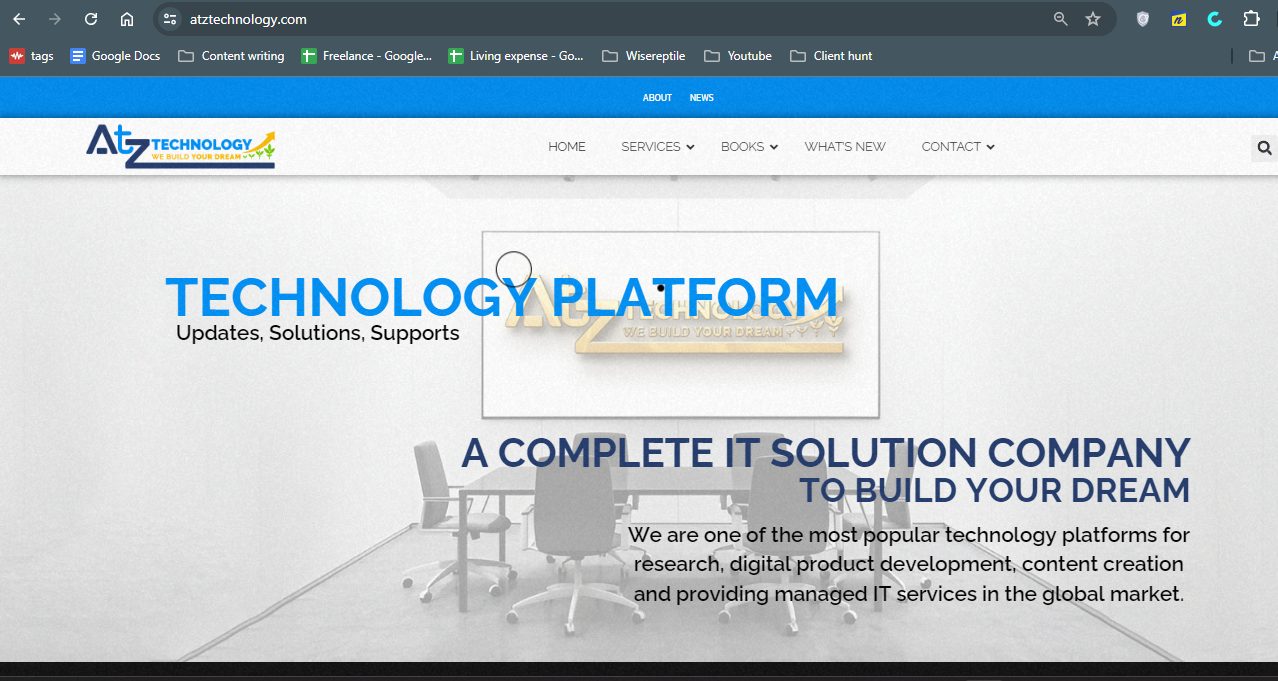
How Do Search Engines Work?
Search engines work in multiple steps. The first step is crawling. The spider comes to your website and scans it. It sees if your page or content aligns with the search engine’s policies. If yes, then your page will be indexed and stored.
The next steps are searching and ranking. Ranking is a crucial part of a search engine. This is what digital marketers, especially SEO experts, are more concerned about.
What Is Ranking?
Ranking is an order. When you search, Google shows various pages. It tries to show the pages in an order. Users consider the upper pages as better match their queries.

Besides, Google may come with 10-20 search result pages. According to Backlinko, only 0.63% of people go to the second page of Google. Think of other pages! So, if you have a website, you have to rank on the first page. The higher, the better.
How Does Search Engine Rank Work?
Search engine ranking works by evaluating web pages based on various criteria. Search engine like Google uses different factors to evaluate a page, such as:
- Keyword relevancy.
- User search intent
- Quality of the content
- Backlinks
- User experience
- Content freshness
- Domain authority
- Social signals
- Technical SEO, etc.
How to Rank Higher on Search Engines?
Different search engines have different algorithms. Since Google is the biggest search engine, let’s talk about it. You need to use relevant keywords in your content or page. And they should have the following qualities:
- Your pages should contain original content. Plagiarism is a big no-no.
- Write informative articles or content that are helpful for the user.
- Ensure your website is mobile-friendly and loads quickly.
- Get backlinks from reputable sites.
- Optimize your meta tags and headers.
- Improve user experience with easy navigation.
- Engage on social media. Keep your content fresh and updated.
- Use proper technical SEO practices.
What Is The Goal of Search Engines?
The goal of search engines is to provide users with the most relevant and useful information. When you make a query, it aims to find the best possible answers. But how does it achieve this?
Search engines use complex algorithms. These algorithms analyze various factors to determine the quality and relevance of web pages. I have already mentioned them in the earlier section.
Have you ever wondered why some websites appear at the top of search results? It’s because they have high-quality content that matches the search query. Additionally, search engines evaluate the overall user experience. This includes how fast a website loads and how easy it is to navigate.
Search engines also prioritize privacy protection and security. They favor websites that use HTTPS encryption. It ensures safe data transmission. Secure websites protect user information from hackers.

How Do Search Engines Make Money?
Search engines help billions of people to find information. But what’s their benefit? They are surely not doing it for free. So, how do they make money? In many ways, actually. For example:
1. PPC Ads
PPC or pay-per-click ads are used by businesses. Advertisers pay the search engine each time someone clicks on their ad. These ads appear at the top or bottom of search results. They are marked as sponsored or ads.
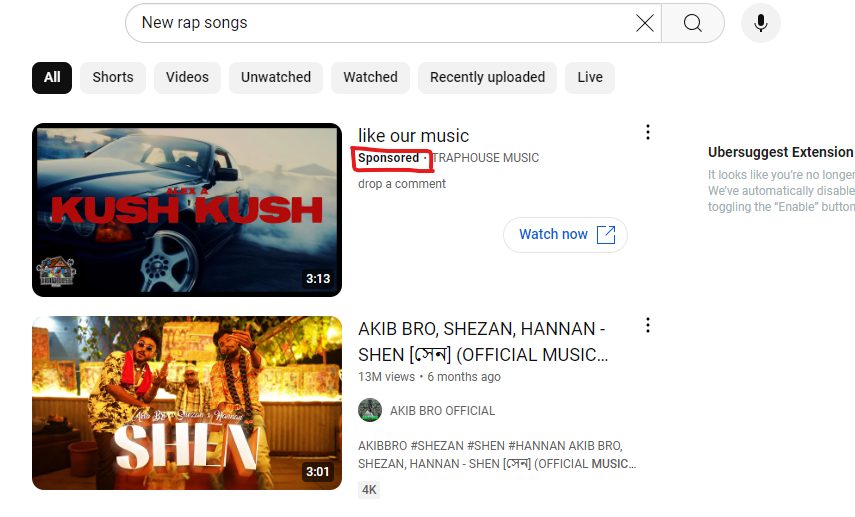
Advertisers bid on keywords relevant to their business. Higher bids can lead to better ad placement. Search engines use an auction system to determine which ads appear. They consider the bid amount and the ad’s quality.
According to WebFX, 65% of small or medium businesses run PPC campaigns. It helps them gain new clients. They experience faster growth and revenue. About $279 billion was spent globally by various businesses for PPC campaigns!
Of course, the ROI is much higher on PPC ads. Stats show that you can earn $2 for spending every $1. This makes PPC one of the most successful marketing strategies. Its popularity is increasing every month.
2. User Data
Search engines also make money by utilizing user data. They collect data on user behavior, preferences, and search history. This data is valuable to advertisers. It helps create targeted advertising campaigns.
Why would advertisers show Google ads? Because they know that Google has data. For example, you make 10 searches each day on leather wrist watches. It tells Google that you like leather watches. So, it will show you leather watches instead of wall clocks.
Can you guess what’s happening here? A wrist watch company can directly show their advertisement to someone who actually likes them. But if the ad was shown on TV, more people would see them. But how many of them would actually like leather watches?
This target orientedness makes Google or search engines a preferred platform for ads. This increases the chances of users clicking on the ads. Advertisers are willing to pay more for targeted ads. They know these ads reach their ideal audience.
3. Contextual Ads
Search engines also generate revenue through contextual ads. These ads match the content of the web page a user is viewing. For example, if you’re reading about travel, you might see ads for flights or hotels.

Contextual ads are highly relevant to the user’s interests. This increases the likelihood of clicks and conversions. Advertisers are willing to pay more for such targeted placement.
Search engines analyze the content of web pages to display appropriate ads. They use algorithms to determine the most relevant ads based on keywords and page context. This ensures a better user experience. Users see ads that are useful and related to what they are already viewing.
Contextual advertising benefits both search engines and advertisers. Search engines earn money by displaying these targeted ads. Advertisers reach their target audience more effectively. This leads to higher engagement and better ROI. This method creates a win-win situation for all parties involved.
4. Donations
Search engines can also receive money through donations. People donate to support free services and information access. Donations help keep the search engine free for all users.
Individuals who value open information often donate. Nonprofits and educational institutions also contribute. They understand the importance of accessible knowledge.
Anyone can make these donations, including you. Don’t you appreciate the service you are getting for free?
Besides, some search engines get more donations when they are new. people want to help them, and so do it. It’s not the biggest earning source for them, though.
5. Affiliate Links
Search engines also make money through affiliate links. These links lead users to products or services. When a user makes a purchase through the link, the search engine earns a commission.
Affiliate links are often integrated into search results or content. They are relevant to the user’s search query or interests. For example, a search for books might show links to purchase those books.
Companies partner with search engines to promote their products. This partnership benefits both parties. Companies get more visibility and potential sales. Search engines earn a commission without charging users directly.
Affiliate marketing helps search engines generate revenue while providing users with helpful product suggestions. It’s a mutually beneficial arrangement that supports free access to search services.
How Do Search Engines Personalize Results?
Do you know search engines do not show the same result for all users who make the same inquiry? The result varies depending on a number of factors. This is what we call personalization. Here is how the personalization process works:
1. Algorithms
Search engines use algorithms to give you personalized results. They track your search history. They look at the websites you visit. They note your location. They even check what device you use. These bits of data help them guess what you like.
This is quite a complex algorithm. It takes into account many information and factors. It helps Google and search engines bring the most desired results for the user.
2. Individual Browsing History
Millions of people are making searches every second. Not all of them search for the same thing. Google and other search engines take notes of what you search. What kinds of content do you click on?

They remember the websites you visit. How long you stay there and what you click on, everything is stored. This helps them understand your interests. Over time, they learn what they like.
So, when you search, they use this history to show you results you might prefer. This makes finding what you need faster and easier.
3. Online Behavior
Search engines watch your online behavior. They record different actions you take, such as:
- The time you spend on each page
- The searches you make
- The ads you interact with
- The videos you watch
- The items you buy online
- The items are left on the cart, etc.
4. Location
Location is a prime factor in personalizing search results. They track where you are when you search. This helps them give you local information. For example, they show nearby restaurants or stores.
You get to know about local news and weather without mentioning your area. Search engines take help from GPS, IP address, and Wi-Fi to find your exact location. This makes your search results more useful. If you search for a service, they show local options first.
5. Demographics
Another important aspect of personalization is demographics. Search engines categorize you into different groups. It includes your age, gender, interests, etc. They also consider your language and education level. This helps them guess what you might like.
For example, a teenager might see different results than an adult. They use data from your profiles and activity. This helps make your searches more relevant.
Your demographics guide search engines in showing ads and content you might prefer. The more they know about you, the better they can tailor your search results. This makes finding what you need quicker and easier.
6. Device
What do you do when using the internet? Is it mobile, computer, or iPad? Search engines know this all. This helps them show results that fit your screen size. They adjust the layout for easy reading. They also note if you use iOS or Android. This helps them suggest apps that work on your device.
7. Social Connections
Your social connections say a lot about you. It tells what kind of people you like, what industry you are interested in, and your preferred age group for connection.
Search engines often suggest results your friends liked. Think about Facebook or LinkedIn. You may have seen on your homepage that one of your friends has commented or liked a certain post.

Benefits of Search Engine Personalization
Personalization is beneficial for users, search engines, and advertisers. Everyone likes this feature of search engines. Here are the major advantages of search engine personalization:
- Time-saving: Personalized results help you find what you need quicker.
- Relevance: Results match your interests and past searches
- Local information: You get local news, weather, and nearby services based on your location.
- Better recommendations: Search engines suggest products, services, and content that fit your preferences.
- Improved user experience: Custom results make searching more enjoyable and efficient.
- Increased engagement: Personalized content keeps you interested and engaged.
- Convenience: Tailored results mean less scrolling and more accurate finds.
- Ad relevance: Ads are more likely to match your interests. It makes them less intrusive.
Popular Search Engines
1. Google
According to Hubspot, Google shares 92% of the total search market worldwide! This domination has increased over the last decade. It is used by millions of people every day. Google is known for its fast and accurate search results. It offers many features like maps, news, and shopping. It is available on all devices and in many languages.
2. Bing
The second most popular search engine is Bing. However, it gets only about 3% of the total search share. This is quite insignificant compared to Google. People use Bing to get detailed search results and a clean interface.
Like Google, Bing has features like image search, video, and news search. The best thing is that Bing rewards users with points for searching. You can redeem this point for gifts.
3. Yahoo

Yahoo is one of the oldest search engines. It offers a wide range of services, including email, news, and finance. Yahoo’s search results are powered by Bing. It is popular for its homepage, which has trending stories and useful links.
Yahoo is still used by many people around the world. However, the number is quite insignificant compared to other search engines. Google’s rise has cost Yahoo in this case. It failed to keep pace with Google’s multi-dimensional innovation.
4. Baidu
Can you think of your life without Google? Not modern life, at least. But billions of people are leading their lives without Google. I am talking about China. The country has banned Google. People use their other search engines.
Baidu is the leading search engine in China. It is similar to Google but tailored for Chinese users. Baidu offers many services like maps, music, and cloud storage. It is designed to meet the needs of the Chinese market. Baidu is the go-to search engine for millions of people in China.
5. DuckDuckGo
DuckDuckGo is a search engine focused on privacy. It does not track your searches or store personal information.
DuckDuckGo provides a simple and clean search experience. It is known for its strong privacy policies. Many people use DuckDuckGo to avoid targeted ads and maintain their privacy online.
Unlike other search engines, DuckDuck gives you more freedom. You can search freely. They won’t track, record, or sell your data. This is quite reassuring in today’s world.
Challenges In Search Engine Technology

It’s not that search engines are almighty without challenges. They actually have plenty of them. The major challenges include the following:
- Privacy concerns: Collecting user data for personalization can raise privacy issues.
- Bias: Algorithms can unintentionally reinforce biases. It affects the fairness of search results.
- Spam and manipulation: Spammers and malicious actors can exploit search engine algorithms to rank harmful or misleading content higher.
- Data accuracy: Ensuring the accuracy and reliability of the vast amount of data used in search results is challenging.
- Language and cultural differences: Adapting search algorithms to work effectively across different languages and cultures is complex.
- Mobile optimization: Ensuring search results are optimized for various devices, especially mobile, is an ongoing challenge.
Why Are Search Engines Important?
Now, the question is, why are search engines important? Why are we discussing it? Well, understanding them is crucial. It can benefit you in a number of ways.
1. Access to Information
Search engines make information accessible to everyone. You are in the USA and can learn about different countries. Whatever you want to know, you search. The rest is left on the search engine.
This open access to information has improved human lives. People in distant places can learn, work, and get help from such information.
2. Research Aid
Research has been made quite easy, thanks to search engines. You don’t have to go through piles of books. Instead, you can easily find what you need. Google Scholar is of great help to researchers. Finding recent and relevant research papers was never so easy.
Not just research papers. You can also look for scholars and professors. This makes research work easier and more effective.

3. Local and Global Connectivity
Search engines connect users globally and locally. They provide access to global information while also directing users to local businesses and services. You can find your nearby restaurants or businesses easily.
Additionally, you can learn about foreign places. Make a search and learn about different businesses. This helps during traveling and touring.
4. Economic Impact
Search engines have opened doors for several new earnings. Many people are working online today.
- Some people are writing articles to provide information. They get paid by advertisers to display ads.
- Some people are working on image and video content.
- Many people work as SEO experts. They help businesses rank higher and get more traffic.
Businesses can also reach new audiences with more efficiency. Users can find businesses online and get more information. This helps businesses gain trust and increase sales.
5. Navigation Assistance

Search engines are crucial for navigating the vast internet. They help users find specific information quickly. By organizing websites and content, they act as guides through the online world.
You can find your desired result within a few clicks. Images, videos, news, etc., all are categorized. You don’t have to scroll through junk links. This saves time and effort.
Search Engine Optimization (Seo)
Here comes the most important part of this article. Optimizing your content or your pages for search engines. It means organizing your content so that Google likes it. If it does, then your page will appear higher. You get more visitors, ads, and sales and generate more money. Here is what you need to do:
- Apply proper SEO practices. It helps you rank higher in SERPs.
- Identify and use relevant keywords that users are likely to search for.
- Create high-quality content with relevant information.
- Gain links from reputable websites to improve authority and credibility
- Enhance website experience to reduce bounce rates.
- Use data analytics to monitor SEO performances.
Final Words
Search engines have become a crucial part of modern life. People are using it every now and then. It helps businesses, students, professionals, children, and everyone else.
You can gain monetary benefits through proper search engine optimization. Grow DigiBusiness excels in this work. We provide complete SEO services, including graphics and content writing. Whether you are in E-Commerce or local service providers, we can help you grow your business using search engines.
